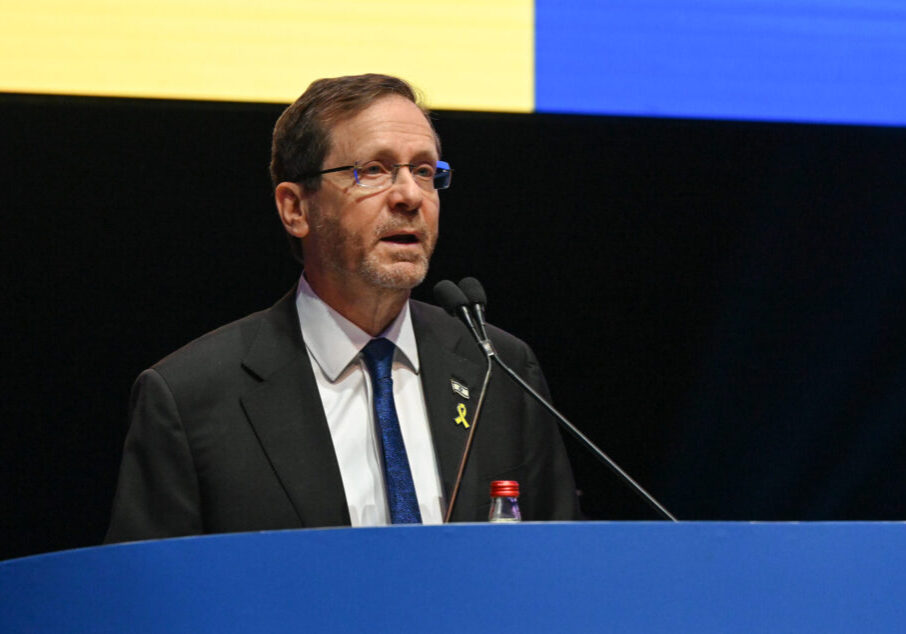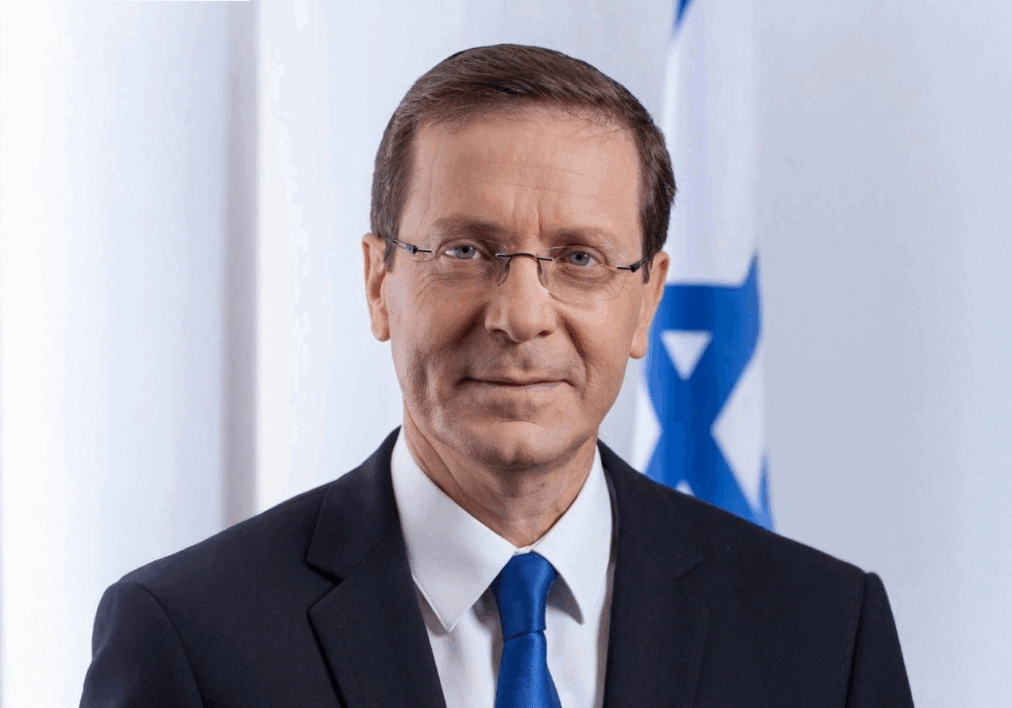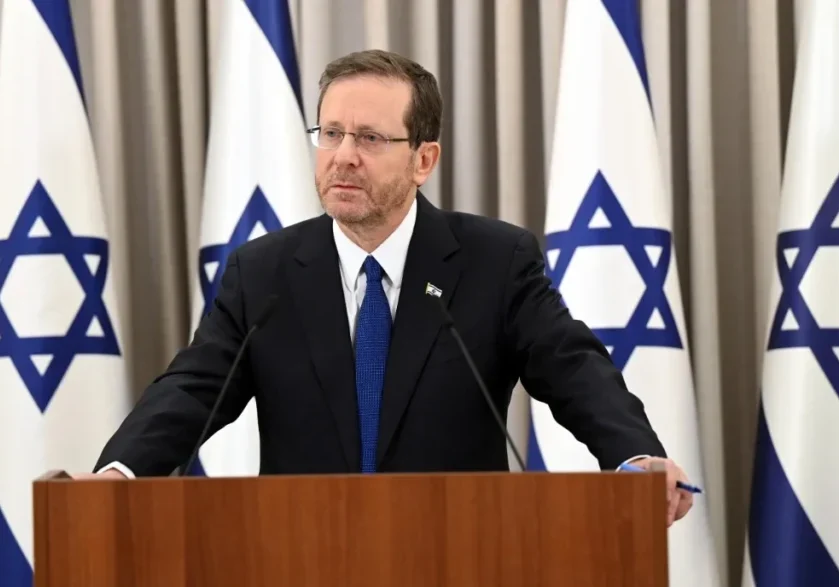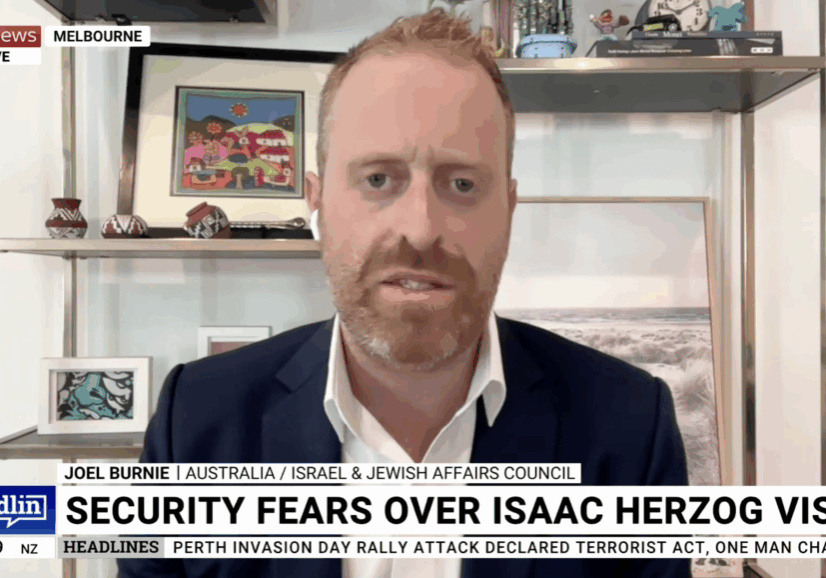Australia/Israel Review
Essay: The Zeal of New Zealand
Aug 27, 2015 | Miriam Smallman
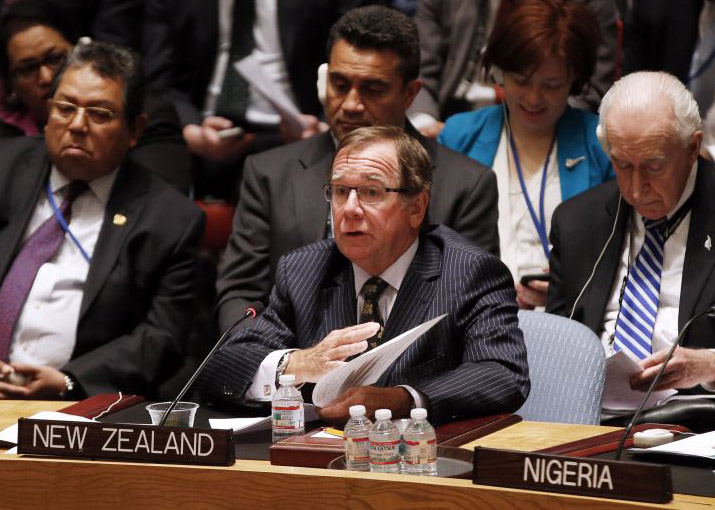
Wellington’s misguided quest to have the UN solve the Israeli-Palestinian conflict
“Sometimes I think to myself, what would it be like to live in New Zealand? To be born on an island in the ocean, in a country that is difficult to spot on the maps…to grow up in the house that grandpa built, and to be the grandson of a grandfather who died a natural death…God! You who chose us from all the nations, I do not have any complaints to you. I accept Your decision with compliance, love, and pride, and I wouldn’t replace Jerusalem with Washington or the tough life in Israel with a much easier life anywhere else on earth. This is my country, my children’s homeland, this is our destiny, and we’ll face it. But don’t be angry, Master of the Universe, if sometimes I think to myself: Is it indeed fair that people in New Zealand die of boredom?”
Poem by Yosef (Tommy) Lapid, late Israeli politician and journalist
In October 2014, after a campaign of nearly 10 years, New Zealand won its fourth two-year term on the esteemed UN Security Council. Prime Minister John Key pledged that New Zealand would be a “small country with a loud voice.” Indeed, it put forth an ambitious agenda, one that included working with the five permanent members of the Council to remove their veto privilege and restarting Israeli-Palestinian peace talks. Murray McCully, New Zealand’s Foreign Minister, said after visiting both Israel and the Palestinian territories earlier this year that his “overwhelming impression” is that the two sides are “not that far apart” and that “the UN Security Council’s a pretty good place to start that conversation.”
Former New Zealand Ambassador to the UN (and current New Zealand Representative to the Palestinian Authority) Jim McLay said as much in a statement at the UN this past January:
“New Zealand believes that failure of this UN Security Council to bring leadership to this issue, at this time, amounts to an abdication of its responsibilities. Arguments that this Council doesn’t have a role, or that it can’t add value, can no longer be justified, particularly as other ways to find a solution haven’t succeeded. Indeed, with its ‘primary responsibility for maintaining international peace and security’, if this Council doesn’t have a role in the current circumstances, it’s hard to envisage when it might have a role.”
As a small state of 4.5 million people, New Zealand has depended on multilateral organisations like the UN to uphold international rule of law, settle disputes peacefully, and ensure collective commitment to a lawful world order. It has also used the UN as a platform to assert itself as a ‘good international citizen’, primarily through its own investments in peacekeeping and peacemaking endeavours. Yet in light of the UN’s inherent inability to act as an honest broker on the Israeli-Palestinian issue, this conviction that the UN is the quintessential body for solving this long-running conflict – or that, as a nation defined by peacekeeping, New Zealand must take up the task – is arguably damaging Wellington’s credibility.
New Zealand and the UN
New Zealand was a founding member of the UN in 1945, and its then-prime minister Peter Fraser was a key figure in establishing the UN’s charter, championing the rights of small nations and advocating for stronger peacekeeping functions.
New Zealand appears to have realised during World War II that it could no longer rely on Great Britain for protection, and saw the burgeoning United Nations as a vehicle to safeguard its ongoing protection through collective security arrangements. Yet while its relatively small geographic size and stature in the international arena could be perceived as a vulnerability, New Zealand has managed to spin this underdog perception as a strength. As Australian international relations scholars Richard Devetak and Jacqui True noted in 2006: “Not seen as a threat to any nation, New Zealand upholds the role of the United Nations as the embodiment of the multilateral process and seeks to win respect from peer member states by determining its policies independently and by being a good international citizen in carrying out peacekeeping roles and promoting international and human rights law.”
New Zealand often takes a measured and independent stance in foreign policy that seems to weigh international public opinion more heavily than Western political influence. In 2003, for example, New Zealand refused to send troops to Iraq in the absence of UN-mandated military action. It has in recent years also reduced, rather than ramped up, its military capabilities: in 2001, New Zealand announced the dismantling of its combat air forces in favour of investing in the peacekeeping capabilities of its small army.
In both UN and non-UN-led missions, New Zealand has deployed peacekeeping forces and civilian police personnel, including to India and Pakistan; the Sinai; Cambodia; the former Yugoslavia; Somalia; Bougainville, Papua New Guinea (where New Zealand was the main mediator in 1997-98); East Timor; Afghanistan; South Korea; Yemen; Tonga and South Sudan, among others.
New Zealand and Israel
The Kiwis’ longest-standing peacekeeping mission, ongoing since 1954, has been via the UN Truce Supervision Organisation (UNTSO), to monitor ceasefires between Israel, Lebanon and Syria. In August, Major General Arthur David (Dave) Gawn, New Zealand’s Chief of Army, was appointed Head of Mission and Chief of Staff of the organisation, which is based in Jerusalem.
On its Foreign Ministry website, New Zealand has expressed its attitude toward the Israeli-Palestinian conflict as “even-handed, balanced and constructive,” deeming this approach “consistent with New Zealand’s international reputation for fair-mindedness. It reflects the value we, as a small country, place on the international rule of law.” Thus, while New Zealand has traditionally voted in support of Israel, that support has always been conditional. The Kiwis supported the 1947 Partition Plan for two states in British-controlled Mandatory Palestine, but criticised it as inadequate in the areas of enforcement and implementation. New Zealand also voted to accept Israel into the UN but persisted in pressuring Israel to deal with the issue of Palestinian refugees from 1948.
In 1954, during New Zealand’s first tenure on the UN Security Council, it submitted a resolution regarding Israel’s complaint that Egypt was restricting freedom of navigation in the Suez Canal and Straits of Tiran; the resolution urged Egypt to heed a 1951 resolution calling for it to comply with the 1949 armistice agreements (however, the USSR vetoed the resolution). In 1966, during its second tenure, it co-sponsored a relatively balanced resolution (to replace an earlier, more antagonistic resolution put forward by Jordan and Mali) pertaining to Israeli retaliation to Syrian air raids. (The USSR also vetoed this resolution.) Yet in 1967 New Zealand joined 98 other UN members in voting at the General Assembly for two resolutions condemning Israel’s annexation of Jerusalem (resolutions from which both Australia and the US abstained.) New Zealand has traditionally (though not always) voted in favour of most resolutions dealing with the Palestinians, including in 2012 when the General Assembly voted to grant Palestine non-member observer State status.
New Zealand-Israel relations soured in 2004 over a scandal involving two Israelis, allegedly Mossad spies, who were found guilty of fraudulently trying to obtain New Zealand passports. The New Zealand government reacted furiously – Prime Minister Helen Clark announced diplomatic sanctions against Israel, suspended high-level visits to and from Israel, and cancelled a planned visit by Israeli President Moshe Katsav. The Israeli government, while neither confirming nor denying that the Israelis were Mossad agents, issued a formal apology in 2005, after which New Zealand officially re-accredited an Israeli ambassador and the two countries began diplomatic reconciliation.
There was a further dispute in 2014, when New Zealand Ambassador to Turkey Jonathan Curr arrived to present his credentials to both Israel and the Palestinian Authority (New Zealand has an embassy in Ankara that handles relations with both governments). The Israeli Foreign Ministry refused to recognise Curr, citing an ongoing policy of requiring separate representatives to Jerusalem and Ramallah. New Zealand ultimately resolved the spat in 2015 by appointing Jim McLay, New Zealand’s representative to the United Nations in New York, as representative to the Palestinian Authority. This could be interpreted as a strategic diplomatic manoeuvre, consistent with New Zealand’s principle of even-handedness. It appeased the Israelis, yet granted the Palestinians a more senior diplomat.
Big Plans at the Security Council
Today, New Zealand wants to use the UN to, yet again, attempt to bring the Israelis and Palestinians together for peace talks. Peacekeeping has proven one of the keystones of New Zealand’s foreign policy, both in and outside the UN and the Kiwis are arguably concerned at the precedent that could be set if the world’s most esteemed and authoritative international body continues to prove impotent in mediating the conflict. New Zealand officially brought Middle East peace onto the Security Council agenda in January 2015 at the Council’s monthly Open Debate on the Middle East. Ambassador McLay said that “New Zealand supports in principle the idea of a suitably balanced Security Council resolution touching on the final status issues – possibly also promoting specific steps to support a resumption of negotiations,” and also suggested it would “be appropriate to establish a realistic time-frame for completing that process.”
In April, following the announcement of plans by France for a Middle East resolution, New Zealand offered conditional support, saying that “if [the resolution] has a chance of succeeding, New Zealand stands ready to engage and to be helpful.” McLay added that New Zealand was also working on a text to revive negotiations, but was waiting to see how a French resolution played out first. Biding its time ultimately worked in New Zealand’s favour, as Prime Minister Netanyahu in June harshly criticised the French proposal – which called for immediate renewal of Israeli-Palestinian talks with an 18-month time frame, and set out what a peace agreement should say on a number of key points. The French government said that once the 18 months was up, it would recognise a Palestinian state whether or not an agreement was reached.
McCully visited Israel and spoke to Netanyahu in June, and, seemed to retreat somewhat from the French approach. He said later that month, “I think what [Israel is] really allergic to is the idea that the Security Council might start the process by imposing a whole lot of conditions, conditions in their view that would favour the other side. I think they’re less allergic to the notion that the Security Council might try and bring the two parties together, and that’s the sort of thing that we’ve got in mind.” Since June, New Zealand has been somewhat vague in its plan of action, saying at the Open Debate on the Middle East in late July, “We see a window of opportunity in the latter part of this year in which the Council should act to create a pathway back to the negotiating table and to support the parties once they are there.”
The problems with a UN solution
Yet unfortunately for New Zealand, the notion of using the UN to revive peace talks is undermined by something that New Zealand has not faced in dealing with other conflicts – the UN is more collectively prejudiced against Israel than against any other single nation, both as an institution and in its membership. This means that it simply cannot play a role as a neutral mediator or arbitrator.
David Harris of the American Jewish Committee has noted that at the UN, “It’s, above all, about numbers.” It is perhaps most clear at the 193-member General Assembly, yet the mathematics working against Israel also persist in smaller bodies, like UNESCO or the Human Rights Council. The 21-member Arab League, the 57-member Organisation of Islamic Cooperation, or the 120-member Non-Aligned Movement, can be counted on to inundate the UN with completely one-sided anti-Israel resolutions while simultaneously shielding their own members from proportionate critical attention.
Similarly, the UN Relief and Works Agency (UNRWA), the UN’s agency specifically for Palestinian refugees, continues to epitomise the UN’s disproportionate treatment of the Israeli-Palestinian conflict. UNRWA, by designating all the descendants of 1948 Palestinians refugees as refugees themselves, has artificially created millions of refugees. It is no secret that parts of the West Bank and Gaza Strip are in dire need of humanitarian aid, but UNRWA’s ongoing presence arguably alleviates pressure on the Palestinian Authority and Hamas to divert funds for those crucial purposes.
In addition, the mandate of the UN’s other refugee body, the Office of the High Commissioner for Refugees (UNHCR), is to resettle refugees; UNRWA refuses to do so “pending the just resolution of the question of the Palestinian refugees,” a euphemism for the legally baseless Palestinian demand for a “right of return” – a demand fundamentally inimical to a genuine two-state peace.The UN’s bias on the Israeli-Palestinian conflict is further demonstrated by the creation of a number of permanent UN bodies specifically committed to the Palestinians and their “cause”. Perhaps the most influential is the UN’s Division of Palestinian Rights, in the Department of Political Affairs; it is the only UN division committed to a single nation or people. These committees serve to act as a megaphone for grievances against Israel – with no proportional committees for genuine human rights violators like Syria, North Korea, Iran or Cuba.
The routine condemnation of Israel was epitomised by the UN Human Rights Council’s stance during the 2014 Israel-Hamas war. Before the war was even over, the Council passed a resolution on July 23 that not only called for an inquiry into Israel’s actions alone, not Hamas’, but also prejudged that inquiry by declaring Israel was definitely guilty of war crimes even before the inquiry had convened.
An ingenuous approach
Ultimately, New Zealand’s failure to recognise the gross imbalance that exists in using the UN as a forum reflects a Kiwi perspective that is perhaps mired in lack of knowledge and naïveté. For instance, Foreign Minister McCully has argued that the veto “is the single largest cause of the UN Security Council being rendered impotent in the face of too many serious international conflicts… whether we are talking about Syria or the Middle-East Peace Process, the veto’s impact today far exceeds what was envisaged in the UN Charter – to the huge detriment of the council’s effectiveness and credibility.”
Yet, as previously described, the UN’s structure is already loaded against Israel; in fact, the veto currently serves as a rare check against the biases. Case in point? At the UN Human Rights Council, where there is no such veto, more resolutions have been passed condemning Israel than about all other countries combined. This plan to get rid of the veto would likely be seen by Israel as a hostile and dangerous motion; if New Zealand can’t recognise – or won’t acknowledge – Israel’s position at the UN and why the veto is unfortunately necessary, its supposedly ‘balanced’ perspective may in fact be somewhat skewed.
An additional example of New Zealand’s apparently wide-eyed approach comes from McCully’s visit to the Middle East in June. His itinerary included meetings with Israeli PM Netanyahu and PA President Abbas, and he came away stressing that the two sides are not that far apart on a two-state peace. But he showed little understanding of the state of the Palestinian Authority and Abbas’ limited authority. Abbas has little political incentive to make peace with Israel and his leadership has no traction in the Gaza Strip, where Hamas has been operating on an almost completely autonomous basis. In fact, Hamas has made a point of refusing cooperation with the PA, accusing it of “high treason” that served “Zionist security” interests and calling for Palestinian factions to take “a firm stand against the Authority’s crimes against the resistance and its members.” If New Zealand intends to make any headway in restarting peace talks, it must recognise and address the role that Hamas plays.
Finally, McCully alluded to the Israeli-Palestinian conflict in early July as “the biggest and most intractable problem on the international stage” – at a time when the whole Mideast region continues to explode with violence and instability. The messy and tragic Syrian civil war, the breakdown of national order in Iraq, Yemen and Libya as well, ISIS expansion in Iraq and Syria, region-wide Sunni-Shi’ite tensions, Iranian proxy operations in at least four different countries are all also taking place on the international stage. None of these catastrophes are at all related to the Israel-Palestinian conflict, yet in McCully’s view, the most urgent priority for the international community is to launch yet another effort to bring about a two-state peace between Israelis and Palestinians, after so many repeated failures.
Yet in order for Israel to feel comfortable coming to the table in UN-mediated peace talks and making painful and risky concessions, some level of trust must exist. The UN’s stances on issues crucial to Israel’s existence and security don’t engender that trust, which is why the UN has not played a central role in Mideast mediation for decades. Previous resolutions to revive peace talks, like the one from France, impose time frames that more or less dictate that the Palestinians will get what they want whether or not an agreement is reached. To understand Israel’s concern about demands for a unilateral withdrawal to the 1967 lines as a ‘punishment’ for not reaching an agreement (something the French resolution contemplated), one must only look at the Gaza Strip, from which Israel unilaterally withdrew in 2005. It was transformed into a base for Hamas to launch thousands of rockets at Israel and dig terror tunnels under the border.
Zeal versus Realism
New Zealand’s month-long presidency on the Security Council in July was primarily concerned with the Iran nuclear deal, but McCully said in a speech at the UN at the end of July, “New Zealand has been clear that we see a window of opportunity in the latter part of this year in which the Council should act to create a pathway back to the [Israeli-Palestinian] negotiating table…that time is now close.”
Peacekeeping has long been an important part of New Zealand’s foreign policy – it has helped bolster New Zealand’s image as a ‘good global citizen’.
Now, the Kiwis are turning to the intractable Israeli-Palestinian conflict, expressing their desire to use the UN as a forum to bring the sides together. Yet internationalising of the conflict, particularly via a body constituted so it is inevitably biased against one party, is not likely to produce the type of meaningful progress that New Zealand is hoping for. Both Israel and the Palestinians must be inherently motivated to make hard choices in negotiations, yet the UN is able to provide such motivation for neither side – constantly reinforcing the Palestinian tradition of remaining entrenched in unwavering positions, yet offering no incentives for Israel to take risks on the basis that Jerusalem’s essential security interests will be provided for.
Wellington doubtless has good intentions in hoping to broker Middle East peace but for all the zeal New Zealand has, the multilateral approach on which its foreign policy has long centred is unlikely to be the path to the peaceful and sustainable diplomatic solution it envisions.
Miriam Smallman is an American Jewish Committee Goldman Fellow
This article is featured in this month’s Australia/Israel Review, which can be downloaded as a free App: see here for more details.
Tags: Israel, New Zealand, Palestinians, United Nations



